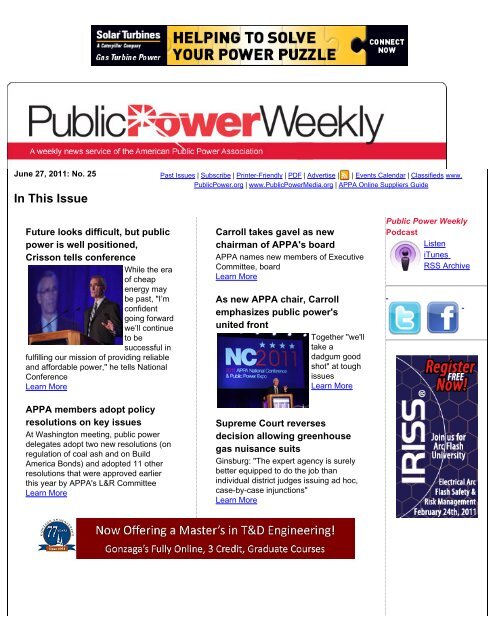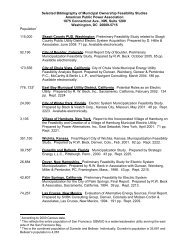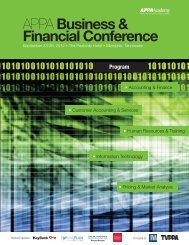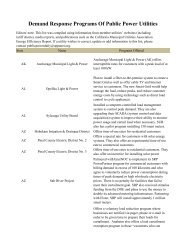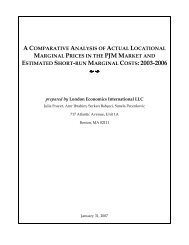Public Power Weekly - American Public Power Association
Public Power Weekly - American Public Power Association
Public Power Weekly - American Public Power Association
Create successful ePaper yourself
Turn your PDF publications into a flip-book with our unique Google optimized e-Paper software.
June 27, 2011: No. 25<br />
In This Issue<br />
Future looks difficult, but public<br />
power is well positioned,<br />
Crisson tells conference<br />
While the era<br />
of cheap<br />
energy may<br />
be past, "I’m<br />
confident<br />
going forward<br />
we’ll continue<br />
to be<br />
successful in<br />
fulfilling our mission of providing reliable<br />
and affordable power," he tells National<br />
Conference<br />
Learn More<br />
APPA members adopt policy<br />
resolutions on key issues<br />
At Washington meeting, public power<br />
delegates adopt two new resolutions (on<br />
regulation of coal ash and on Build<br />
America Bonds) and adopted 11 other<br />
resolutions that were approved earlier<br />
this year by APPA's L&R Committee<br />
Learn More<br />
Past Issues | Subscribe | Printer-Friendly | PDF | Advertise | | Events Calendar | Classifieds www.<br />
<strong>Public</strong><strong>Power</strong>.org | www.<strong>Public</strong><strong>Power</strong>Media.org | APPA Online Suppliers Guide<br />
Carroll takes gavel as new<br />
chairman of APPA's board<br />
APPA names new members of Executive<br />
Committee, board<br />
Learn More<br />
As new APPA chair, Carroll<br />
emphasizes public power's<br />
united front<br />
Together "we'll<br />
take a<br />
dadgum good<br />
shot" at tough<br />
issues<br />
Learn More<br />
Supreme Court reverses<br />
decision allowing greenhouse<br />
gas nuisance suits<br />
Ginsburg: "The expert agency is surely<br />
better equipped to do the job than<br />
individual district judges issuing ad hoc,<br />
case-by-case injunctions"<br />
Learn More<br />
<strong>Public</strong> <strong>Power</strong> <strong>Weekly</strong><br />
Podcast<br />
Listen<br />
iTunes<br />
RSS Archive
Talent shortage looms as<br />
economy improves, utility<br />
recruiter says<br />
Contracting through joint action agency<br />
works for Glendale Water and <strong>Power</strong><br />
Learn More<br />
Utilities need strategic approach<br />
to meeting future challenges,<br />
consultant tells APPA audience<br />
"By having the most reliable, most costeffective<br />
energy, we will become the<br />
most competitive economy"<br />
Learn More<br />
EPA extends comment period on<br />
proposal to limit utility<br />
emissions of mercury, other<br />
toxics<br />
Those who want to fine comments have<br />
an additional month to do so. The new<br />
deadline is Aug. 4.<br />
Learn More<br />
Moody's seeks public comments<br />
on its plan to revise financial<br />
metrics for public power ratings<br />
Comments on the proposed changes are<br />
due in 60 days<br />
Learn More<br />
FTC probes possible<br />
manipulation of oil markets<br />
Commission will use its subpoena power<br />
Learn More<br />
Announcement about release of<br />
oil reserves sends price down<br />
US to release 30 million barrels in next<br />
month; other countries will chip in a like<br />
amount to bring the total to 60 million<br />
barrels<br />
Learn More<br />
CPS Energy to close large coalfired<br />
plant by 2018, will invest in<br />
new IGCC plant to be built in<br />
Texas<br />
The city wants to define itself "by taking<br />
the mantle of the new energy economy,"<br />
said the mayor<br />
Learn More<br />
Consumer advocates at APPA<br />
conference emphasize<br />
affordability, planning<br />
AARP is fuel<br />
neutral, but has<br />
concerns about<br />
both climate<br />
change and<br />
nuclear power<br />
because of<br />
affordability<br />
questions<br />
Learn More<br />
Congress unlikely to do much<br />
on energy, key Senate staffers<br />
say<br />
The Senate probably wouldn’t do<br />
anything the House passes and the<br />
House "would probably not pass<br />
anything we do"<br />
Learn More<br />
EPA sets schedule for issuing<br />
new air toxic standards for<br />
boilers<br />
EPA will propose updated standards in<br />
October, issue final rule by April 2012<br />
Learn More<br />
House committee delays<br />
consideration of coal ash bill<br />
Bill would bar regulation of coal ash as a<br />
hazardous waste<br />
Learn More
APPA offers two webinars<br />
this week on pole<br />
attachments, designing<br />
substations<br />
Pole attachment session is June<br />
28; substation design session is<br />
June 29<br />
Learn More<br />
In pictures . . .<br />
Learn<br />
More<br />
Future looks difficult, but public power is well positioned, Crisson tells<br />
conference<br />
While the era of cheap energy may be past, "I’m confident going forward we’ll continue to be<br />
successful in fulfilling our mission of providing reliable and affordable power," APPA<br />
President and CEO Mark Crisson told attendees of the association’s National Conference<br />
June 20. The issues facing APPA and public power in 2011 are difficult and the long-term<br />
outlook doesn’t look any better, but "when I look at how public power is positioned ... I’m<br />
optimistic," Crisson said at the opening general session of the conference in Washington, D.C.<br />
Crisson said the outlook for the next decade reminded him of the story of<br />
a utility executive who asked a fortune teller about the future. Photo by<br />
Dennis Brack<br />
pressures, particularly with coal, he added.<br />
Crisson said the outlook<br />
for the next decade<br />
reminded him of the<br />
story of a utility<br />
executive who asked a<br />
fortune teller about the<br />
future. The fortune teller<br />
said the next three to<br />
four years would be very<br />
difficult and challenging<br />
—and after that, "you’ll<br />
get used to it." The<br />
problem starts with oil<br />
costs, which are $90/<br />
barrel in a weak<br />
economy and will only<br />
go up as the economy<br />
recovers, he said.<br />
Expect other cost<br />
There will be some real incentives to move to a lower carbon portfolio over the next decade,<br />
Crisson said, which means increased energy efficiency, nuclear and renewables. Technology<br />
will have to play an expanded role and "we just need some new energy infrastructure," he<br />
said. All these things point to the need for significant new capital, which will have an impact<br />
on rates. The challenge for the industry going forward will be to just keep power costs flat in<br />
real terms [increasing no more than the rate of inflation] during the 21st century, he said. "I’d<br />
consider that a real success for the industry."<br />
However, public power has a number of advantages, he said. "We’re not for profit, we’re<br />
locally owned and controlled, we’re very good at matching local resources with local needs."<br />
<strong>Public</strong> power’s business model complements an aggressive energy efficiency program, and
public power utilities enjoy strong customer relationships, Crisson said. <strong>Public</strong> power also has<br />
the financial ability to develop new infrastructure, with 100% debt financing and strong credit<br />
ratings, which are a real asset, he said.<br />
"Then there are what I would call the intangibles," Crisson said: the tradition of service,<br />
reliability and strong track record of financial integrity. <strong>Public</strong> power utilities are governed by<br />
citizens who "are purpose-driven, not profit-driven," he said.<br />
APPA’s priorities for 2011 jibe pretty well with the rest of the utility industry, Crisson said.<br />
"Right at the top of the list" are environmental regulations that have come to be known as the<br />
train wreck. APPA is very busy trying to make sure the Environmental Protection Agency<br />
regulations are workable, he said. In its comments to EPA, APPA is calling for a balanced<br />
approach that takes into consideration costs, reliability and the time needed to comply, he<br />
said.<br />
Another APPA priority, new infrastructure, covers a lot of issues, but Crisson focused on<br />
natural gas, saying "it’s hard to see how we won’t use a lot of natural gas." One public power<br />
CEO said he’s pretty sure we’ll see $10 natural gas because everyone seems to be planning<br />
on $4 natural gas, he said.<br />
Reliability/cyber security is another priority that is taking up a lot of time of APPA staff,<br />
Crisson said. The association is holding a series of webinars to help members deal with the<br />
new reliability regime and its huge amounts of paperwork and APPA Senior Director of Policy<br />
Analysis Allen Mosher chairs the North <strong>American</strong> Electric Reliability Corp. Standards<br />
Committee, where he is helping move the industry toward results-based standards, Crisson<br />
said.<br />
APPA has developed a lot of ways to support another priority, demand-side initiatives,<br />
Crisson said. These include the Demonstration of Energy-Efficient Developments (DEED)<br />
program; the Clean and Efficient Energy Program with the Alliance to Save Energy and Large<br />
<strong>Public</strong> <strong>Power</strong> Council; APPA’s Energy Efficiency Resource Central website; and its Smart<br />
Grid Investment Grant Working Group, he said. Energy efficiency is a "no regrets" strategy<br />
that makes a lot of sense regardless of any regulatory mandates, he said.<br />
Restructured markets are APPA’s final priority for 2011, he said. The basic problem is that<br />
prices in the restructured markets exceed competitive levels and capacity is not being built,<br />
he said. He noted that APPA’s Electric Market Reform Initiative has received many<br />
contributions from non-RTO regions, perhaps on the theory that "the best defense is a good<br />
offense." APPA recently released an update of its Competitive Market Plan. The<br />
recommendations remain the same but they "are more necessary and relevant," he said. —<br />
ROBERT VARELA<br />
Back To Top<br />
APPA members adopt policy resolutions on key issues<br />
APPA members approved two new policy resolutions at the association’s National<br />
Conference June 21, one on regulation of coal ash and the other on Build America Bonds.<br />
After amending two of them, the association also adopted 11 resolutions previously approved<br />
by APPA's Legislative and Resolutions Committee. (See <strong>Public</strong> <strong>Power</strong> <strong>Weekly</strong>, March 7,<br />
2011.)<br />
The resolution on coal combustion residuals, or coal ash, opposes their regulation as a<br />
hazardous waste under Subtitle C of the Resource Conservation and Recovery Act and<br />
supports safe and beneficial reuse of residuals. In the other new resolution, APPA supports<br />
the reinstatement of the Build America Bonds program for ongoing improvement of local<br />
economic development, infrastructure and job creation.<br />
A resolution on implementation of the Dodd-Frank Wall Street Reform and Consumer<br />
Protection Act was amended to reflect events since it was approved as interim policy by the<br />
Legislative & Resolutions Committee. The amended resolution calls on Congress to pass<br />
1875 Connecticut Ave., NW<br />
Suite 1200<br />
Washington, DC 20009-5715<br />
Voice : 202/467-2900<br />
Fax : 202/467-2910 www.<br />
<strong>Public</strong><strong>Power</strong>.org<br />
Senior Vice President,<br />
Publishing<br />
Jeanne Wickline LaBella<br />
202/467-2948<br />
JLaBella@publicpower.org<br />
Editorial Director<br />
Robert Varela<br />
202/467-2947<br />
RVarela@publicpower.org<br />
Managing Editor<br />
Jeannine Anderson<br />
202/467-2977<br />
JAnderson@publicpower.org<br />
Online & Magazine Editor<br />
David L. Blaylock<br />
202/467-2946<br />
DBlaylock@publicpower.org<br />
Circulation<br />
Susan Lynch<br />
202/467-2970<br />
SLynch@publicpower.org<br />
Mali Liu<br />
202/467-2987<br />
MLiu@publicpower.org<br />
<strong>Public</strong> <strong>Power</strong> <strong>Weekly</strong> is<br />
published weekly except the last<br />
week of the year by the<br />
<strong>American</strong> <strong>Public</strong> <strong>Power</strong>
legislation giving the Commodity Futures Trading Commission and other regulators additional<br />
time to implement the derivatives title of the Dodd-Frank Act. The legislation should be<br />
structured to ensure the agencies define all necessary terms (such as "swap") before moving<br />
forward with additional rulemaking, APPA said.<br />
A resolution on reasonable regulation by the Environmental Protection Agency of emissions<br />
of mercury and other hazardous air pollutants from generation was updated. APPA strongly<br />
encouraged EPA to repropose the rule, including both more realistic compliance deadlines<br />
and standards for new coal-fired power plants. Reproposing the rule also would allow the<br />
agency to correct an error made in the conversion factor for its analysis of the rule, APPA<br />
said.<br />
The 13 approved resolutions are:<br />
• Resolution 11-01: <strong>Public</strong> <strong>Power</strong> Concerns with Implementation of the Dodd-Frank Act<br />
• Resolution 11-02: In Support of Coordination among Federal Agencies and Electric Utilities<br />
Regarding Smart Grid Implementation<br />
• Resolution 11-03: In Support of Increasing Energy Efficiency in Model National Building<br />
Codes<br />
• Resolution 11-04: Support for Property Assessed Clean Energy Program<br />
• Resolution 11-05: Cooling Water Intake Structures – CWA Section 316(b) Regulation as an<br />
Industry Economic and Strategic Priority<br />
• Resolution 11-06: Clean Air Act and EPA's Discretionary Authority to Set Standards, Revise<br />
Standards, and Impose Deadlines for Compliance<br />
• Resolution 11-07: Regarding Reasonable EPA Regulation of Electric Generating Units<br />
Under NESHAP<br />
• Resolution 11-08: In Support of Reasonable Operational Limits for Municipal Reciprocating<br />
Internal Combustion Engine Distributed Generation Units Covered by EPA’s National<br />
Emission Standards for Hazardous Air Pollutants<br />
• Resolution 11-09: In Support of Holistic Policy Approach on Integration of Variable Energy<br />
Resources<br />
• Resolution 11-10: <strong>Public</strong> <strong>Power</strong> Concerns Regarding Implementation of "MOD" Reliability<br />
Standards in the Western Interconnection<br />
• Resolution 11-11: In Support of Efforts to Maintain and Improve the Reliability of the<br />
Nation’s Electric Grid<br />
• Resolution 11-12: Opposition to Coal Combustion Residuals Being Regulated under Subtitle<br />
C of the Resource Conservation and Recovery Act<br />
• Resolution 11-13: In Support of Build America Bonds.<br />
The resolutions will be posted on APPA’s website. —ROBERT VARELA<br />
Back To Top<br />
Carroll takes gavel as new chairman of APPA's board<br />
William Carroll, general manager of the Greeneville Light & <strong>Power</strong> System in Greeneville,<br />
Tenn., was installed as chair of the APPA board of directors on June 22 at the association's<br />
National Conference in Washington, D.C.<br />
<strong>Association</strong>, 1875 Connecticut<br />
Ave. N.W., Washington, D.C.<br />
20009- 5715. Copyright © 2011,<br />
<strong>American</strong> <strong>Public</strong> <strong>Power</strong><br />
<strong>Association</strong>.<br />
Non-member subscriptions to<br />
<strong>Public</strong> <strong>Power</strong> <strong>Weekly</strong> cost $440.<br />
Non-member subscriptions to<br />
<strong>Public</strong> <strong>Power</strong> Daily cost $840. A<br />
subscription to both newsletters<br />
costs $995 per year.<br />
Advertising<br />
For information on advertising,<br />
contact Erik Henson at Naylor<br />
LLC; 800/369- 6220 or<br />
EHenson@Naylor.com.<br />
Classified Advertising<br />
Go to Careers in <strong>Public</strong> <strong>Power</strong> at<br />
www.<strong>Public</strong><strong>Power</strong>.org or contact<br />
David L. Blaylock at APPA,<br />
202/467-2946
A native of Columbia, Tenn., Carroll has almost 40 years of experience in the public power<br />
sector. He began his career at the Columbia <strong>Power</strong> and Water Systems in 1972 and became<br />
general manager in 1981. He joined Greeneville Light & <strong>Power</strong> as general manager in 1990.<br />
Throughout his career, Carroll has been an active participant in the utility industry, serving as<br />
chairman of the Tennessee Valley <strong>Public</strong> <strong>Power</strong> <strong>Association</strong> and the Tennessee Municipal<br />
Electric <strong>Power</strong> <strong>Association</strong> as well as president of the Appalachian District <strong>Power</strong> Distributors<br />
<strong>Association</strong>.<br />
"Bill Carroll is a recognized public power leader who brings extensive management<br />
experience, in depth industry knowledge, and proven leadership to the board chair position,"<br />
said APPA President and CEO Mark Crisson. "His abilities are well suited to the challenges<br />
faced by APPA as we strive to assure our members continue to provide affordable and<br />
reliable electric service."<br />
Phyllis Currie, general manager of Pasadena Water and <strong>Power</strong> in California, is APPA's chairelect<br />
for 2011-12 and Gary Stauffer, executive director, NMPP Energy, Lincoln, Neb., is vice<br />
chair. Lonnie Carter, president and CEO of Santee Cooper, Moncks Corner, S.C., is<br />
immediate past chair. Leon Pexton, general manager and chief operating officer, Utah<br />
Municipal <strong>Power</strong> Agency, is treasurer.<br />
Carroll chose five members of the board to serve with the officers on the APPA Executive<br />
Committee. They are: Paula DiFonzo, CEO of New Braunfels Utilities in Texas; Bob Jolly,<br />
general manager of the Marblehead Municipal Light Department in Massachusetts; Robert<br />
Johnston, president and CEO, MEAG <strong>Power</strong>, Atlanta, Ga.; James Posey, general manager of<br />
the Anchorage Municipal Light and <strong>Power</strong> Department in Alaska; and Robert Williams,<br />
general manager, Carthage Water and Electric Plant, Missouri.<br />
Newly elected to the APPA board this year are: Douglas Hunter, general manager, Utah<br />
Associated Municipal <strong>Power</strong> Systems; Andrew Boatright, manager, Westerville, Ohio, Electric<br />
Division; Ron Bowman, city manager, Boerne, Texas; Cindy Holman, general manager,<br />
Oklahoma Municipal <strong>Power</strong> Authority; Steven Blanchard, general manager, Fayetteville, N.<br />
C., <strong>Public</strong> Works Commission; John DiStasio, general manager and CEO, Sacramento<br />
Municipal Utility District; and Walter Haase, general manager, Navajo Tribal Utility Authority.<br />
Three board members were re-elected to another three-year term: Pat McCullar, president<br />
and CEO, Delaware Municipal Electric Corp.; Paul Pallas, superintendent, Rockville Centre,<br />
N.Y.; and Steven Klein, general manager, Snohomish County, Wash., <strong>Public</strong> Utility District.
APPA's Executive Committee for 2011-12. Back row, from left: Lonnie Carter, James Posey,<br />
Leon Pexton, Robert Williams, Gary Stauffer. Front row: Phyllis Currie, Bill Carroll, Bob Jolly,<br />
Paula DiFonzo. Not pictured is Robert Johnston. Photo by Dennis Brack<br />
Back To Top<br />
As new APPA chair, Carroll emphasizes public power's united front<br />
In his opening remarks as the new chairman of APPA’s board of directors on June 22, Bill<br />
Carroll made a self-deprecating pitch for continued unity by public power utilities. My wife told<br />
me, "I don’t think you’re smart enough for this APPA job," Carroll told attendees at the<br />
association’s National Conference. But "nobody is smart enough to do this by themselves,"<br />
said Carroll, the general manager of the Greeneville, Tenn., Light & <strong>Power</strong> System. "Together<br />
we may not master every task put before us, but we’ll take a dadgum good shot at it."<br />
He called on the public power audience to keep four points in mind: math, science,<br />
economics and ethics. Apply those four principles to the challenges facing the industry and<br />
"we can help elected officials" come up with good answers to those challenges, he said.<br />
Carroll addresses attendees of APPA's National Conference after taking the<br />
gavel as the new head of the association's board of directors for 2011-12.<br />
Photo by Dennis Brack<br />
Earlier, Carroll said<br />
he plans "to work<br />
hard this year to<br />
educate nonmembers<br />
on the<br />
value of APPA<br />
membership so<br />
they understand<br />
and appreciate that<br />
supporting APPA’s<br />
voice in<br />
Washington is of<br />
benefit to them and<br />
to those who<br />
ultimately must pay<br />
the price for all<br />
legislative actions,<br />
their retail<br />
customers."<br />
In spite of the<br />
daunting issues<br />
facing the industry, "I remain optimistic," outgoing APPA Chairman Lonnie Carter told the<br />
National Conference attendees. "<strong>Public</strong> power is customer-focused and, because of that<br />
laser-like focus, we are well-positioned."<br />
"More than ever, I believe in public power and APPA, the association that leads us," said<br />
Carter, president and CEO of Santee Cooper.<br />
Back To Top<br />
Supreme Court reverses decision allowing greenhouse gas nuisance suits<br />
The Supreme Court ruled unanimously June 20 that the Clean Air Act bars federal common<br />
law suits seeking to restrict greenhouse gas emissions on the ground that they constitute a<br />
public nuisance. In <strong>American</strong> Electric <strong>Power</strong> Co. v. Connecticut, the high court reversed a<br />
decision by the U.S. Court of Appeals for the Second Circuit allowing a suit by a group of<br />
states to proceed against AEP, the Tennessee Valley Authority, Southern Co., Xcel Energy<br />
and Duke Energy Corp.
"The critical point is that Congress delegated to [the Environmental Protection Agency] the<br />
decision whether and how to regulate carbon dioxide emissions from power plants; the<br />
delegation is what displaces federal common law," Justice Ruth Bader Ginsburg wrote in a<br />
decision on behalf of the court.<br />
"The expert agency is surely better equipped to do the job than individual district judges<br />
issuing ad hoc, case-by-case injunctions," Ginsburg said. "Federal judges lack the scientific,<br />
economic, and technological resources an agency can utilize in coping with issues of this<br />
order."<br />
Eight states—California, Connecticut, Iowa, New Jersey, New York, Rhode Island, Vermont<br />
and Wisconsin—filed the suit in 2004, but New Jersey and Wisconsin withdrew from the case<br />
earlier this year.<br />
APPA, the Edison Electric Institute and National Rural Electric Cooperative <strong>Association</strong> filed<br />
a joint brief last year urging the Supreme Court to grant AEP’s appeal and overturn the<br />
Second Circuit decision. Regulation of greenhouse gases "is too consequential, and too<br />
complex, to address on a piecemeal basis" through "nuisance" suits in different courts across<br />
the country, the utility associations said. —ROBERT VARELA<br />
Back To Top<br />
Talent shortage looms as economy improves, utility recruiter says<br />
With utility managers throughout the United States facing a shortage of qualified electrical<br />
engineers as the baby boom generation retires and universities produce fewer electrical<br />
engineers, Carl Mycoff, president of Mycoff, Fry & Prouse, and Glenn Steiger, general<br />
manager of Glendale, Calif., Water and <strong>Power</strong>, discussed strategies for addressing this<br />
problem with attendees of the APPA National Conference in Washington, D.C.<br />
Many engineers have stayed in their jobs out of dedication to the industry and because of the<br />
economic uncertainty of the last few years, but a severe talent shortage is on the horizon as<br />
roughly 78 million baby boomers are expected to retire in the next few years. Their<br />
replacements—from "Generations X and Y"—have different expectations regarding work<br />
environment, autonomy, communication style, and flexibility, Mycoff said. These differences<br />
often result in friction among the generations.<br />
Studies have found that Generation X, born between 1961 and 1981, is highly individualistic,<br />
values freedom, and enjoys responsibility—but has a disdain for authority and structured<br />
work hours, Mycoff said. Simply put, Generation X employees do not like to be<br />
micromanaged. Generation Y, born between 1978 and 2000, prefers to communicate through<br />
email and text messaging rather than face-to-face contact, he said. Friendship is a strong<br />
motivator for Generation Y workers, who will choose a job just to be in close proximity to their<br />
friends.<br />
The individualism of Generation X and the communication style of Generation Y frustrate<br />
baby boomers, Mycoff said. In the end, organizations suffer because institutional knowledge<br />
is not passed along, he noted.<br />
The problem is magnified in the utility industry by the sharp decline in the number of electrical<br />
engineers that graduate each year. Many universities reduced spending on power<br />
engineering programs or eliminated electrical engineering programs altogether after the<br />
technology bubble of the 1990s burst, Mycoff said. As a result, the number of electrical<br />
engineering graduates is down drastically, from 2,000 per year in the 1990s to a current rate<br />
of approximately 500 per year. Competition to hire these electrical engineering graduates is<br />
aggressive, and starting salaries reflect the shortage, he said.<br />
<strong>Public</strong> power utilities will be hit especially hard because the salaries that they offer are
estricted by political pressures, Mycoff said. Promising talent is often lured away by higher<br />
salaries at investor-owned utilities and cooperatives. It is also common for public power<br />
utilities to hire and train electrical engineers, only to lose them once they are a valuable<br />
asset, he said.<br />
Mycoff recommended that public power utility executives work to communicate the value of<br />
the utility managers and engineers to local government officials and the community. A public<br />
power utility executive is equivalent to the executive running the local hospital so public utility<br />
salaries should be benchmarked in this way and should not be constrained by comparisons<br />
to the salaries of other municipal departments, he said. The utility executive deserves<br />
differentiation because he or she is handling millions of dollars for the community. Mycoff<br />
acknowledged that even with a public relations effort, truly competitive compensation may not<br />
be possible.<br />
Mycoff suggested a number of solutions and Steiger told conference attendees that he has<br />
had success using a number of these strategies. Mycoff and Steiger both recommended<br />
allowing experienced workers to continue working part-time and encouraging them to mentor<br />
newer employees. Up to 75% of baby boomers would like to continue working in some<br />
capacity after retirement, Mycoff said. <strong>Public</strong> power utilities can appeal to baby boomers and<br />
younger workers by offering flexible work and vacation schedules, as well as cafeteria<br />
benefits. Mycoff also suggested hiring local talent with ties to the community.<br />
Glendale Water and <strong>Power</strong> is taking this a step further and is currently working with Glendale<br />
Community College to support the newly established Verdugo <strong>Power</strong> Academy to meet the<br />
talent needs of the future, Steiger explained.<br />
Mycoff also recommended eliminating nepotism policies that further shrink the pool of<br />
qualified applicants. Many times, the friends and family of a current employee already know<br />
the value of public power and make excellent and dedicated hires, he said.<br />
Because of rapid changes in technology, utilities often need to find the right expertise quickly.<br />
Mycoff suggested working with joint action agencies to find second- or third-party contractors<br />
to address this need. Contractors can transfer knowledge and expertise to current utility<br />
employees and then move on to help another utility when they are no longer needed, he<br />
said.<br />
Steiger explained that Glendale Water and <strong>Power</strong> has been "sharing the pain" with other city<br />
departments and has implemented a multi-year hiring freeze. During this hiring freeze,<br />
organizational requirements have continued to expand, he said. Energy trading, renewable<br />
generation and smart grid initiatives all required highly specialized expertise, he said. Steiger<br />
looked to his joint action agency, the Southern California <strong>Public</strong> <strong>Power</strong> Authority (SCPPA), for<br />
assistance. SCPPA worked successfully with Glendale to contract the necessary experts,<br />
Steiger said.<br />
The advantages of this approach include instant expertise, defined time frame, and training<br />
for regular full-time staff, he said. He credited this strategy with helping Glendale Water and<br />
<strong>Power</strong> reduce electric rates by 11%, increase its renewable portfolio to over 24%, and<br />
increase wholesale revenue by $32 million. —JENNIFER MITCHELL<br />
Back To Top<br />
Utilities need strategic approach to meeting future challenges, consultant<br />
tells APPA audience<br />
<strong>Public</strong> power utilities need to develop strategies to increase customer satisfaction, increase<br />
reliability and decrease the cost of electricity, Rodger Smith, president of Black & Veatch<br />
Consulting, told an APPA audience June 20.<br />
Elected officials in cities facing financial pressures may look at utility assets with an eye on<br />
selling them, warned Smith. Keep them, he said – they are revenue-producing assets that<br />
will enable the city to grow the local economy.
He spoke at a session of the APPA National Conference in Washington and urged public<br />
power managers to take a strategic approach to meeting future challenges.<br />
President Obama in his State of the Union address earlier this year said, "The future is ours<br />
to win. We can’t get it standing still." That message, while true, lacked vision, Smith said.<br />
The president needs to send a message to the <strong>American</strong> people like President Kennedy’s<br />
message in 1961: "We will put a man on the moon before the end of the decade." President<br />
Obama’s message should have been: "By having the most reliable, most cost-effective<br />
energy, we will become the most competitive economy on the planet," Smith said.<br />
Smith listed several "strategic imperatives" for the utility industry to move forward to meet the<br />
"most competitive economy" vision. Among them: understand the nexus of water and energy<br />
and the nexus of the gas and electric industries. <strong>Public</strong> power utilities are better situated than<br />
investor-owned utilities for recognizing these connections, he said.<br />
The utility industry made bad assumptions about what customers want with the smart grid,<br />
Smith said. Customers want only to know how soon power will be back on when the lights go<br />
out. "They are less interested in having the utility come to their side of the meter."<br />
Equipment vendors are trying to dictate energy policy, he said. "This is bad." He advised his<br />
audience to be skeptical about predictions of rapidly growing adoption of electric vehicles<br />
over the next few years. A Chevy Volt costs $46,000 and its battery pack would have to be<br />
replaced after four years. Consumers will not be attracted to that economic equation, he said.<br />
—JEANNE LABELLA<br />
Back To Top<br />
EPA extends comment period on proposal to limit utility emissions of<br />
mercury, other toxics<br />
The Environmental Protection Agency has extended the deadline for public input by 30 days<br />
—until Aug. 4—on its proposed rule to limit emissions of mercury and other air toxics from<br />
power plants. The extension will not alter its timeline for issuing the final regulation in<br />
November, the agency said. The extension of the comment period was an "effort to be<br />
responsive to Congress and to build on the robust public comment process," EPA<br />
Administrator Lisa Jackson said. The agency proposed the standard in March.<br />
APPA and the National Rural Electric Cooperative <strong>Association</strong> in May asked EPA to extend<br />
the comment period on the proposed rule.<br />
The standards will be phased in over three years, and states have the ability to give facilities<br />
a fourth year to comply. Currently, more than half of all coal-fired power plants already have<br />
pollution control technologies that are called for to meet the standards. Once they are final in<br />
November, these standards will require the remaining coal-fired plants, roughly 44% of the<br />
fleet, to install controls. —R.V.<br />
Back To Top<br />
Moody's seeks public comments on its plan to revise financial metrics for<br />
public power ratings<br />
In a June 17 report and request for comment, Moody's Investors Service outlines changes it<br />
is considering in how it determines credit ratings for public power utilities. The credit rating<br />
company said it is considering modifications of three of its key financial metrics "in response<br />
to heightened concern regarding comparability across operating models and the need for<br />
supportive liquidity as utilities in the United States face uneven and challenging economic<br />
conditions."<br />
The report and request for comment, Moody's Considers Use Of New Financial Metrics In U.
S. <strong>Public</strong> <strong>Power</strong> Electric Utility Rating Methodology, is posted on www.moodys.com.<br />
Moody’s is updating its U.S. <strong>Public</strong> <strong>Power</strong> Electric Utility Rating Methodology, originally<br />
published in September 2008. As part of this update, Moody’s is asking for comments on<br />
adjustments it is proposing to the three financial metrics:<br />
• the debt service coverage ratio,<br />
• the fixed obligation charge coverage ratio, and<br />
• the days cash on hand ratio.<br />
The proposal to change the debt service coverage ratio recognizes that most public power<br />
utilities transfer a portion of their surplus revenues to a municipal government, typically to a<br />
city or county at an agreed-upon level. "While the transfers come after debt service in the<br />
legal flow of funds, practically the transfer is a requirement and in many cases the transfer is<br />
made on a monthly basis," Moody's said. Therefore, Moody’s is proposing to treat the<br />
transfer as an operating expense.<br />
Moody’s said it will calculate the adjusted debt service coverage ratio by dividing annual net<br />
revenues by total debt service costs. The ratio "measures a utility’s ability to repay annual<br />
debt service costs from recurring revenues net of recurring expenses, as well as the utility’s<br />
resiliency to withstand revenue and expense volatility," the company said.<br />
Moody’s second proposed adjustment to the debt service coverage ratio is a new "fixed<br />
obligation charge coverage ratio" that incorporates debt-like obligations related to the<br />
ownership of generation assets through a joint power agency under take-or-pay contracts.<br />
Many public power electric utilities finance the development or purchase of generation assets<br />
through such joint agencies. Moody’s said it views these contractual obligations as fixed and<br />
the annual payments as debt-like obligations. Moody’s fixed obligation charge coverage ratio<br />
subtracts the take-or-pay contractual payment from the utility’s operating expenses when<br />
calculating net revenues, and subsequently adds the take-or-pay contractual payment to the<br />
total debt service costs when calculating coverage.<br />
The adjusted ratio "facilitates uniform comparisons of utilities that directly finance generation<br />
assets on balance sheet with utilities that finance assets through joint power agencies off<br />
balance sheet," Moody's said.<br />
Moody’s also proposes to change the way it calculates its "current days cash on hand" ratio.<br />
The current days cash on hand ratio is calculated based on a utility’s available and<br />
unrestricted cash and investments times 365 days divided by a utility’s annual operating and<br />
maintenance expenses. Moody’s plans to replace the traditional days cash on hand ratio with<br />
the "adjusted days cash on hand ratio," which subtracts from available cash and investments<br />
"any actual collateral posting requirements with a counterparty and the difference between a<br />
fully funded annual debt service reserve and the actual debt service reserve funding level<br />
maintained by the utility."<br />
The proposed changes in the three financial metrics "allow for greater comparability amongst<br />
different types of public power utilities by incorporating additional liquidity and debt like<br />
obligations into the financial ratios, essentially adjusting for different approaches to<br />
generation ownership, debt structuring, and liquidity management," Moody's said.<br />
The comment period will close in mid-August, 60 days after the date of the report. —<br />
JEANNINE ANDERSON<br />
Back To Top<br />
FTC probes possible manipulation of oil markets<br />
The Federal Trade Commission has opened an investigation into possible manipulation of<br />
wholesale oil markets. The commission said it will use its subpoena power in a probe of<br />
"whether certain oil producers, refiners, transporters, marketers, physical or financial traders,<br />
or others (1) have engaged or are engaging in practices that have lessened or may lessen<br />
competition – or have engaged or are engaging in manipulation – in the production, refining,
transportation, distribution, or wholesale supply of crude oil or petroleum products; or (2)<br />
have provided false or misleading information related to the wholesale price of crude oil or<br />
petroleum products to a federal department or agency."<br />
Crude oil and refined petroleum product prices and profit margins "increased substantially<br />
earlier this year," the FTC said in a June 20 letter to Sen. Richard Blumenthal, D-Conn. "The<br />
Energy Information Administration reported that as of early May, U.S. refiners’ refining<br />
margins had increased more than 90% since the beginning of 2011, and U.S. refiners at that<br />
time were using only 81.7% of their capacity, representing a 7% reduction from the same<br />
period in 2010." —ROBERT VARELA<br />
Back To Top<br />
Announcement about release of oil reserves sends price down<br />
Oil prices fell June 23 after the United States and other industrialized countries said they<br />
would release 60 million barrels of crude oil from their reserves over the next 30 days in an<br />
effort to drive down energy prices.<br />
Half of that amount will come from the U.S. Strategic Petroleum Reserve in what the Energy<br />
Department said will be the largest release ever from the U.S. reserves.<br />
The International Energy Agency, which seldom intervenes in oil markets, said the action was<br />
meant to ensure a "soft landing for the world economy." In New York, the announcement sent<br />
oil prices down by $4.31, to $91.10 a barrel. —J.A.<br />
Back To Top<br />
CPS Energy to close large coal-fired plant by 2018, will invest in new IGCC<br />
plant to be built in Texas<br />
Saying it is positioning itself to be at the forefront of a "new energy economy," the municipal<br />
electric utility in San Antonio, Texas, announced June 20 that it will shut its 871-MW J.T.<br />
Deely power plant by 2018, about 15 years earlier than had been planned. CPS Energy said<br />
it will replace part of the energy from J.T. Deely by buying 200 MW of electricity from a clean<br />
coal plant to be built near Odessa, Texas.<br />
The Deely plant, built in the 1970s, will be the first coal plant in Texas to shut down, the<br />
Associated Press reported. The clean coal plant that will replace part of Deely's capacity will<br />
use integrated gasification combined-cycle technology to capture 90% of the plant's carbon<br />
dioxide and more than 95% of its mercury and sulfur, CPS Energy said.<br />
"This is a moment not only to dream big, but to deliver on those dreams," said San Antonio<br />
Mayor Julián Castro, who announced the plan June 20. The city wants to define itself "by<br />
taking the mantle of the new energy economy," he said. "By building a critical mass<br />
around research and development that will grow and attract the brainpower of the 21st<br />
century, San Antonio can be for the new energy economy what Silicon Valley is to software<br />
and what Boston is to biotech." A video of his remarks is available on the Internet.<br />
Last year, CPS Energy asked its staff to increase the utility’s renewable resources to 20%<br />
(1,500 MW) by 2020 and to have 65% of its generation resources be low- or no-carbon.
The San Antonio utility has an agreement to buy 200 MW from the clean coal plant for 25<br />
years. Construction of the IGCC plant is expected to begin in late 2011 or early 2012 and be<br />
completed in late 2014 or early 2015. The project, called the Texas Clean Energy Project, will<br />
be a coal-fired, 400-MW IGCC facility that will incorporate carbon capture and storage<br />
technology. It will be built by Summit <strong>Power</strong> of Seattle.<br />
"We have a model project that will change how the world views coal-fueled power," said Eric<br />
Redman, president of Summit <strong>Power</strong>.<br />
Thanks to the agreement with CPS Energy, the Texas Clean Energy Project "now becomes<br />
one of the nation's leading clean coal projects," The Energy Daily reported June 23.<br />
The Deely plant could have operated until 2030, but in order to meet new regulations<br />
anticipated from the Environmental Protection Agency, CPS Energy would have had to install<br />
a $550 million scrubber, according to the Associated Press. The municipal utility decided that<br />
would not be a wise expenditure, and opted instead to close the plant and invest in clean-coal<br />
and solar technology, said CPS Energy spokeswoman Lisa Lewis. The city-owned utility also<br />
is ramping up its energy-efficiency efforts.<br />
"San Antonio is stepping up to lead Texas and our nation into a clean energy future—and<br />
proving that investing in innovative technology to protect our health and the environment is<br />
also a great way to create jobs," said EPA Administrator Lisa P. Jackson. "By sending a<br />
strong signal of the local government’s support for clean energy, San Antonio attracted<br />
innovative <strong>American</strong> businesses that will create jobs around technology that helps to keep<br />
the air clean."<br />
The same day they announced the plan to close the Deely coal plant, Mayor Castro and CPS<br />
Energy President & CEO Doyle Beneby announced agreements to bring five clean<br />
technology businesses to San Antonio. Beneby introduced the CEOs of companies that will<br />
partner with CPS Energy:<br />
• Consert CEO Jack Roberts announced the relocation of that company’s headquarters from<br />
Raleigh, N.C., to San Antonio. The move is expected to bring 50 jobs by the first quarter of<br />
2012, with additional jobs generated through the installation and use of the company’s energy<br />
management software in as many as 140,000 San Antonio homes and businesses by 2015.<br />
CPS Energy launched a pilot program with Consert in 2010 and expects to broaden that pilot<br />
to 1,000 customers later this year. Using the Consert software, customers set user profiles<br />
through their home computers for heating and air conditioning systems, water heaters and<br />
pool pumps to manage their homes’ energy demands. Used in conjunction with other smart<br />
grid initiatives such as advanced meters, the program helps customers automate their energy<br />
conservation and manage their bills, while allowing the utility to conserve energy during<br />
periods of high use, CPS Energy said.<br />
• GreenStar Executive Vice President Rod Gray announced the relocation of the company's<br />
headquarters from nearby Boerne, Texas, to San Antonio, along with 35 jobs. While showing<br />
off a locally assembled street light that uses light-emitting diode technology, Gray said<br />
GreenStar will replace 25,000 street lights in San Antonio, beginning with downtown,<br />
improving the efficiency of decades-old infrastructure.<br />
• ColdCar USA CEO Paul Duran II announced the relocation of his company's headquarters<br />
and 35 of its 45 jobs from Boerne to San Antonio by December. The company assembles<br />
refrigerated trucks used to deliver food items to consumers, and is transitioning its vehicles to<br />
electric and hybrid trucks. CPS Energy will partner with ColdCar on the installation of electric<br />
charging stations for these vehicles.<br />
• Summit <strong>Power</strong>'s Eric Redman provided an overview of plans to provide 200 MW of<br />
purchased power to CPS Energy from the IGCC plant to be built near Odessa. He said the<br />
clean coal plant will provide compressed CO2 for enhanced oil recovery, and will produce<br />
urea fertilizer and sulfuric acid for farming.<br />
• SunEdison CEO Carlos Domenech outlined plans for the solar developer to locate 30 MW<br />
of new solar generation in the CPS Energy service territory. The company plans to open a
egional office in San Antonio later this year.<br />
At the June 20 event announcing the agreements with the clean energy companies, Beneby<br />
asked the audience to stay tuned for more. The selection of another solar provider is<br />
expected within 30 days, following a Feb. 1 request for proposals, he said.<br />
"We are leveraging our low-carbon and renewable energy resources to stimulate economic<br />
and educational development within our community," Beneby said. "At the same time, we’re<br />
reducing power plant emissions by tens of thousands of tons per year—the equivalent of<br />
taking almost 1 million vehicles off our roads," he said. "At CPS Energy, we have the enviable<br />
position of having safe, affordable nuclear power and a new coal plant with the best available<br />
emissions control technology. These resources allow us to support the development of clean<br />
technologies to generate electricity, while maintaining rates among the lowest in the nation."<br />
The U.S. Department of Energy said June 20 it "applauds CPS Energy for its progressive<br />
energy stance that includes voluntarily phasing out old coal plants and replacing them with<br />
cleaner, low-carbon technologies." DOE awarded $450 million to the Texas Clean Energy<br />
Project last year.<br />
CPS Energy provides electricity to approximately 717,000 customers and natural gas to<br />
325,000 customers in and around San Antonio. The utility said it ranks among the nation’s<br />
lowest-cost energy providers and is No. 1 in wind-energy capacity among municipally owned<br />
utilities. —JEANNINE ANDERSON<br />
Back To Top<br />
Consumer advocates at APPA conference emphasize affordability,<br />
planning<br />
The need for long-term planning and a balanced, consumer-focused approach to energy<br />
policy were consistent themes at a panel discussion among consumer advocates at APPA’s<br />
National Conference June 21. APPA President and CEO Mark Crisson moderated the<br />
session featuring Maryland People’s Counsel Paula Carmody, AARP Senior Legislative<br />
Representative Marti Doneghy and <strong>Public</strong> Citizen Director Tyson Slocum.<br />
The current political climate is a problem, the consumer advocates agreed. While the reality<br />
is that we can’t replace all our sources of electricity in the near future, "one difficulty is that we<br />
are so at odds with each other we can’t engage in long-term planning," Carmody said.<br />
Building coalitions and finding common ground on specific issues with groups that you<br />
disagree with on other matters is important, the panelists said.<br />
Asked about key issues, Carmody cited operation of the centralized wholesale markets, in<br />
particular PJM’s capacity market; mergers, including the pending Constellation Energy-<br />
Exelon union; smart grid and smart meters; energy efficiency and demand response; and<br />
infrastructure investment. She said her office advocates for reliable, affordable service, but<br />
mid- and long-term costs need to be considered and "that’s tricky," she said. A more<br />
methodical planning process is needed, she said.<br />
Slocum said his priority is consumer-focused climate change legislation with an orderly<br />
process that provides bargaining room and mitigates costs to consumers. It’s folly for the<br />
United States to enact strict controls if nations like China and India don’t, he said. More<br />
stakeholders like public power utilities are needed at the table to find a consumer-friendly<br />
approach to greenhouse gas emissions, he told the National Conference attendees. <strong>Public</strong><br />
power utilities also should be more aggressive about trumpeting their energy efficiency<br />
accomplishments, he said.<br />
Doneghy cited affordability as AARP’s key issue. While the association is fuel neutral, it has<br />
concerns about both climate change and nuclear power because of affordability questions,<br />
she said. Privacy in connection with cyber security is an emerging issue, she said. Contrary<br />
to views that AARP is anti-technology, the association is very supportive of improvements to<br />
the grid, but is concerned about the affordability of smart meters, she said.
Asked what AARP would like to see from public power, Doneghy delivered the best line of the<br />
conference: "We’d like to see every utility be a public power utility."<br />
Panel questions nuclear power costs, waste disposal<br />
During the question-and-answer period, Bill Carroll, general manager of the Greeneville Light<br />
& <strong>Power</strong> System in Tennessee, asked the panelists for their views on nuclear power.<br />
"We are not opposed to nuclear power, but we are very much opposed to the unaffordability<br />
of it," said Doneghy. "The tendency of the industry is to want all their money up front," she<br />
said. Builders of nuclear plants have asked for their money "years in advance," even decades<br />
in advance sometimes, she said. AARP is "fuel neutral," but the nuclear power industry "has<br />
not been friendly toward consumers in terms of cost," Doneghy said. "Why should ratepayers<br />
be saddled with exorbitant costs, years ahead of time?" she asked.<br />
"Whatever your views on nuclear plants, there are questions about whether they can be built<br />
economically," said Carmody. "We do have some concerns about upfront cost recovery," said<br />
Carmody, who also is vice president of the National <strong>Association</strong> of State Utility Consumer<br />
Advocates. "There is a history of significant cost overruns in the past," she said, and "there<br />
are concerns about the loan guarantee issues."<br />
The dilemma of where to store spent nuclear fuel rods "is an issue our country just doesn’t<br />
want to deal with," Carmody said. "In Maryland, those rods are sitting in water." A lesson<br />
learned from the Japanese disaster at the Fukushima Daiichi nuclear power plant "is that we<br />
have to pay more attention to the storage of these rods," she said.<br />
The centralized storage of nuclear waste "is not going to happen," said Tyson<br />
Slocum of <strong>Public</strong> Citizen, right. With him on the June 21 panel were, from left:<br />
Paula Carmody, Marti Doneghy and APPA CEO Mark Crisson. Photo by Dennis<br />
Brack<br />
that would cost much less.<br />
The problems<br />
facing nuclear<br />
plants "are<br />
economic, not<br />
regulatory," said<br />
Slocum. "’The<br />
industry<br />
continues to<br />
maintain this<br />
model of building<br />
huge $10 billion<br />
plants" that take<br />
too long to<br />
construct, in a<br />
process that<br />
"eats up way too<br />
much public<br />
money," he said.<br />
He noted,<br />
however, that<br />
some utilities are<br />
looking at small<br />
modular units<br />
The issue of what to do with nuclear waste "is significant," Slocum said. The idea of storing<br />
spent fuel and other waste at Yucca Mountain in Nevada was proposed before the United<br />
States was hit by the terrorist attacks of Sept. 11, 2001, he said. As a result of those attacks,<br />
the centralized storage of nuclear waste "is not going to happen" because there would be too<br />
much opposition to shipments of waste passing through communities in rail cars, he said.<br />
<strong>Public</strong> Citizen has been working with the staff of Rep. Edward Markey, D-Mass., "on making<br />
storage more long-term and safer through dry storage casks," he said. —ROBERT VARELA<br />
and JEANNINE ANDERSON<br />
Back To Top
Congress unlikely to do much on energy, key Senate staffers say<br />
Don’t look for much energy legislation out of Congress, key congressional staffers told<br />
APPA’s National Conference June 21. The Senate probably wouldn’t do anything the House<br />
passes and the House "would probably not pass anything we do," said Leon Lowery, Senate<br />
Energy Committee Chairman Jeff Bingaman’s electricity expert. Kellie Donnelly, deputy chief<br />
counsel for Republicans on the committee, agreed.<br />
In contrast to last year’s comprehensive energy bill (S. 1462), which died in the House, the<br />
Senate Energy Committee this year is looking for discrete measures that the two parties can<br />
agree on. Lowery said the committee probably could get floor time for such items.<br />
However, agreement has been hard to come by, mainly because some members are<br />
insisting on offsets for any new spending authorizations, Donnelly said. Even though<br />
authorizations don’t mean that any money will be appropriated for a program, members want<br />
new authorizations to be balanced by spending cuts or deauthorizations, she said. For<br />
example, the Hydropower Improvements Act, S. 629, passed the committee with bipartisan<br />
support, but "we don’t have a path forward" because of objections to a lack of offsets, she<br />
said.<br />
Lowery and Donnelly agreed that cyber security legislation is on the short list of bills that may<br />
be passed, if not this year at least during this Congress. The committee approved a cyber<br />
security bill in May, after revising it to preserve a role for the North <strong>American</strong> Electric<br />
Reliability Corp., Donnelly said. However, APPA and other electric industry groups still have<br />
concerns about the scope of the Federal Energy Regulatory Commission’s authority in the bill.<br />
The Senate Energy Committee’s cyber bill will be melded into a comprehensive bill, along<br />
with cyber legislation from six other committees. Fall is probably the earliest that a<br />
comprehensive cyber security bill could be put together, Donnelly said.<br />
Mary Neumayr, senior energy counsel to the House Energy and Commerce Committee, said<br />
the Energy and <strong>Power</strong> Subcommittee expects to work on its discussion draft cyber bill, the<br />
GRID Act, "in the near future."<br />
Hearings or legislation on transmission costs are a possibility, but not until after FERC issues<br />
its pending rule on allocation of transmission costs, Lowery said. —ROBERT VARELA<br />
Back To Top<br />
EPA sets schedule for issuing new air toxic standards for boilers<br />
The Environmental Protection Agency said June 24 it will propose updated standards for<br />
emissions of air toxics from industrial boilers and certain solid waste incinerators by the end<br />
of October and will issue final standards by the end of April 2012. The agency set the<br />
schedule in a filing with the U.S. Court of Appeals for the District of Columbia Circuit.<br />
EPA issued a final air toxics rule for boilers in February, but at the same time said it would<br />
reconsider the standards because the final version differed significantly from the proposal<br />
and the agency thought further public review was required. EPA in May stayed the effective<br />
date of the standards for major source boilers and commercial and industrial solid waste<br />
incinerators; it did not stay the effective date of the standards for boilers located at area<br />
sources of air toxic emissions.<br />
Back To Top<br />
House committee delays consideration of coal ash bill<br />
The House Energy and Commerce Committee will wait until after the chamber’s July 4 recess
to mark up legislation to prevent the Environmental Protection Agency from regulating coal<br />
ash as a hazardous waste. Committee Chairman Fred Upton, R-Mich., said the delay may<br />
allow supporters to get more Democrats to back the bill, the Coal Residuals Reuse and<br />
Management Act.<br />
The bill would require EPA to conform to its 2000 finding that coal combustion residuals,<br />
commonly called coal ash, do not warrant regulation as a hazardous substance under<br />
Subtitle C of the Resource Conservation and Recovery Act. The measure also would<br />
authorize states to implement coal combustion residuals permit programs to regulate disposal<br />
of coal ash in surface impoundments and other land-based units.<br />
Back To Top<br />
APPA offers two webinars this week on pole attachments, designing<br />
substations<br />
APPA is offering two webinars this week, one on the updated pole attachment order<br />
from the Federal Communications Commission and the other on incorporating threedimensional<br />
design tools into the substation design process.<br />
"FCC Pole Attachment Order and Implications for <strong>Public</strong> <strong>Power</strong>" will be held on<br />
Tuesday, June 28 from 2 to 3:30 p.m. Eastern time. Jim Baller, president, and Sean<br />
Stokes, principal, both with the Baller Herbst Law Group, will provide a detailed<br />
overview of the FCC order to amend its pole attachment rules, which was approved on<br />
April 7, 2011, and discuss the implications for public power.<br />
Most public power utilities are exempt from the FCC’s rules, but the utilities are<br />
indirectly affected because the new make-ready provisions and approach to calculating<br />
the telecom formula provide a benchmark for pole attachment access and rates.<br />
This webinar is free for those who attended the March 17, 2011, webinar "Pole<br />
Attachments – FCC Proceeding and Implications for <strong>Public</strong> <strong>Power</strong>." Otherwise, the fee<br />
is $89 for APPA members and $179 for nonmembers.<br />
On Wednesday, June 29, from 2 to 3:30 p.m. Eastern time, APPA, in conjunction with<br />
Autodesk, will hold a webinar on "Designing Substations with Digital Prototypes:<br />
Nashville Electric Service Moves Beyond 3D."<br />
Geoff Zeiss, industry program director for utilities with Autodesk, will discuss how<br />
utilities can utilize Autodesk’s design software to develop digital prototypes of<br />
substations and explore and enhance each design before it is built. Terri Humel,<br />
principal associate engineer for Nashville Electric Service, will discuss how NES<br />
implemented this technology and how it has increased the speed and accuracy of the<br />
design process.<br />
This webinar is being offered at a discounted rate of $49 for APPA members and $139<br />
for nonmembers.<br />
Each webinar is worth 0.2 continuing education credits and 1.5 professional<br />
development hours. For more information and to register, go to www.APPAAcademy.<br />
org and click on Webinar Series, or contact Kristine Landau at 202/467-2919 or<br />
KLandau@<strong>Public</strong><strong>Power</strong>.org. —HEIDI LAMBERT<br />
Back To Top
In pictures . . .<br />
The Duke Ellington School of the Arts Show Choir performed a powerful rendition of the Star-<br />
Spangled Banner June 20 at the opening of the APPA National Conference in Washington, D.<br />
C. Photo by Dennis Brack<br />
Maude Grantham-Richards, right, electric utility director of the Farmington Electric Utility<br />
System in New Mexico, received APPA's highest honor, the Radin Distinguished Service<br />
Award, at the association's National Conference June 21 in Washington, D.C. Presenting<br />
her with the award was Lonnie Carter, president and CEO of Santee Cooper in South<br />
Carolina, chair of the APPA board of directors for 2010-11. Photo by Dennis Brack
APPA President and CEO Mark Crisson, at podium, describes upcoming environmental<br />
regulations expected to affect utilities. Photo by Dennis Brack<br />
Back To Top<br />
Classifieds<br />
Management<br />
Superintendent—City of<br />
Monmouth, Ore., <strong>Power</strong> & Light.<br />
Due to the retirement of the<br />
incumbent, the city of<br />
Monmouth, Oregon, seeks<br />
applicants for the position of<br />
superintendent of the city’s<br />
electric utility department. The<br />
<strong>Power</strong> and Light Department is<br />
an integral part of a wellmanaged<br />
and progressive city<br />
organization. The<br />
superintendent is a direct report<br />
to a city manager that reports to<br />
a supportive and effective City<br />
Council. Ideal candidates will<br />
offer broad experience and a<br />
successful record in hands-on<br />
electric distribution utility<br />
management. The<br />
superintendent is responsible for<br />
planning, directing, managing,<br />
and overseeing all activity for the<br />
<strong>Power</strong> & Light Department<br />
Substation technician<br />
Substation technician—GEUS.<br />
Requires high school diploma or<br />
equivalent. Applicant must have<br />
a minimum of five years<br />
experience. Prefer electrical<br />
utility background, experience in<br />
switching and operation of<br />
substation equipment,<br />
manufacturers or industrial<br />
training on breakers,<br />
transformers or battery<br />
maintenance. Must determine<br />
cause of electrical control<br />
problems and needed repairs,<br />
read and interpret blueprints and<br />
schematic drawings, operate<br />
electrical test equipment.<br />
Perform maintenance,and repair<br />
of circuit breakers, transformer<br />
load tap changers, station<br />
batteries, switchgear, control<br />
wiring and other substation<br />
equipment. Starting wage DOQ<br />
plus benefits. To apply, submit a<br />
City of Greenville/GEUS
including administration,<br />
engineering, construction,<br />
operations, maintenance, and<br />
purchasing materials while<br />
working with peer managers<br />
employed by the city to ensure<br />
the financial performance of the<br />
electric utility and provide<br />
optimal service to customers.<br />
The ideal candidate will offer the<br />
following traits:<br />
• 10 years of progressively<br />
responsible electric utility<br />
management or an equivalent<br />
combination of education and<br />
experience that demonstrates<br />
qualification;<br />
• Comprehensive knowledge and<br />
hands-on experience with<br />
electric utility construction,<br />
planning, scheduling, operations,<br />
maintenance, and purchasing<br />
procedures;<br />
• Effective working knowledge of<br />
NEC, NERC and FERC<br />
Compliance Standards, WECC,<br />
NESC, OPUC, and OSHA;<br />
• Working knowledge of the<br />
Bonneville <strong>Power</strong> Administration<br />
and general power supply<br />
administration in the Northwest<br />
Region;<br />
• Experience in public rates,<br />
finance, workforce development,<br />
and labor unions;<br />
• Excellent leadership, people,<br />
interpersonal, and<br />
communication skills and a<br />
commitment to teamwork within<br />
a municipal environment;<br />
• Proactive orientation that will<br />
keep the city well-positioned in a<br />
dynamic industry environment.<br />
Candidates that can effectively<br />
demonstrate most but not all of<br />
these requirements are<br />
encouraged to apply. While<br />
public utility experience is<br />
desired, those individuals from<br />
private utility sectors are also<br />
encouraged to apply.<br />
Monmouth <strong>Power</strong> & Light lies<br />
application form. Resumes may<br />
be submitted as an addendum to<br />
the official application form.<br />
Submit to the City of Greenville<br />
Human Resources Office<br />
located at 2821 Washington St.,<br />
by U.S. mail to P.O. Box 1049,<br />
Greenville, Texas 75403;<br />
through email to jobapps@ci.<br />
greenville.tx.us. Application<br />
forms are available to download<br />
on the city's website at: www.ci.<br />
greenville.tx.us. (903/457-<br />
3118 or for TDD, (903/457-3128.<br />
Open until filled.<br />
Lineworker—The city of Ames,<br />
Iowa, is accepting applications<br />
for a journey-level electric<br />
lineworker. This position<br />
performs work related to the<br />
construction, maintenance, and<br />
repair of overhead and<br />
underground electrical<br />
distribution and transmission<br />
systems. Hourly rate: $32.26/<br />
hour, plus standby pay and a<br />
comprehensive benefit package.<br />
To apply, go to www.cityofames.<br />
org/index. aspx?page=128<br />
Application deadline is Friday,<br />
June 24, 2011, at 5 p.m. Central<br />
Standard Time. Requires<br />
completion of a recognized<br />
apprenticeship-training program<br />
in high voltage electric<br />
transmission and distribution<br />
system repair, and a valid<br />
driver’s license. Must obtain a<br />
Type A Commercial Driver’s<br />
License within one month of<br />
appointment. A post-job offer<br />
physical, including drug test also<br />
required.<br />
Key accounts<br />
Key account representative—<br />
RPU, a division of the city of<br />
Rochester, Minn. (pop. 106,000),<br />
is the largest municipal utility in
within the lush Willamette Valley,<br />
20 miles west of Salem and 55<br />
minutes east of the Oregon<br />
coast. We serve 4,200 electric<br />
customers, including Western<br />
Oregon University. Please email<br />
questions and resumes to<br />
mail@mfpllc.us and include<br />
"Monmouth Superintendent" in<br />
the subject line.<br />
Check out APPA's career services on the Web<br />
the state of Minnesota and is<br />
seeking an outgoing,<br />
professional personality to<br />
manage the energy service<br />
needs of industrial and<br />
commercial accounts. Salary<br />
range $73,099 to $107,497. As<br />
the third largest city in the state<br />
of Minnesota and one of the<br />
fastest-growing municipalities,<br />
the city of Rochester is often<br />
named as a best place to live,<br />
raise a family, and retire. In<br />
2010, Kiplinger named<br />
Rochester one of the Top Ten<br />
Cities for the Next Decade. City<br />
applications are required and will<br />
be accepted until the position is<br />
filled. Applications received by<br />
June 18, 2011 will be given<br />
priority consideration. Apply<br />
online at: www.rochestermn.gov.<br />
EOE.<br />
Visit the Career Center at <strong>Public</strong><strong>Power</strong>.org. Our career center allows job seekers to upload<br />
resumes—and recruiters to obtain resumes from job seekers. APPA members can post<br />
online ads for $175 for a 30-day posting or $225 for a 60-day posting (rates are $275 and<br />
$325, respectively, for nonmembers). Ads in <strong>Public</strong> <strong>Power</strong> Daily and <strong>Public</strong> <strong>Power</strong> <strong>Weekly</strong><br />
cost 70 cents per word for members and 80 cents per word for nonmembers, for a oneweek<br />
run. Job posting subscriptions are available in packages of five or 10, or unlimited for<br />
a full year. If you have questions about classified ads, write or call Robert Varela,<br />
rvarela@<strong>Public</strong><strong>Power</strong>.org or 202/467-2947.<br />
Back To Top<br />
Events Calendar
Webinar – FCC Pole Attachment<br />
Order and Implications for <strong>Public</strong><br />
<strong>Power</strong><br />
June 28<br />
Webinar – Designing Substations<br />
with Digital Prototypes: Nashville<br />
Electric Service Moves Beyond 3D<br />
June 29<br />
Webinar – RP3 Series: Safety<br />
July 6<br />
Webinar – Superconductivity<br />
Applications Update<br />
July 12<br />
For a full APPA Events Calendar, visit <strong>Public</strong>power.org.<br />
Back To Top<br />
Webinar – RP3 Series: Reliability<br />
July 13<br />
Webinar – Developments in Real-<br />
Time Energy Management<br />
July 14<br />
Webinar – Strategic Planning for<br />
Utility Boards and City Councils<br />
July 19<br />
Webinar – RP3 Series: System<br />
Improvement<br />
July 20<br />
Webinar – Tips on Developing a<br />
Successful DEED Grant Proposal<br />
July 20<br />
Webinar – RP3 Series: Work<br />
Force Development<br />
July 27<br />
Webinar – Performance<br />
Monitoring and Accountability for<br />
Boards<br />
Aug. 16<br />
Copyright © 2011, <strong>American</strong> <strong>Public</strong> <strong>Power</strong> <strong>Association</strong>


